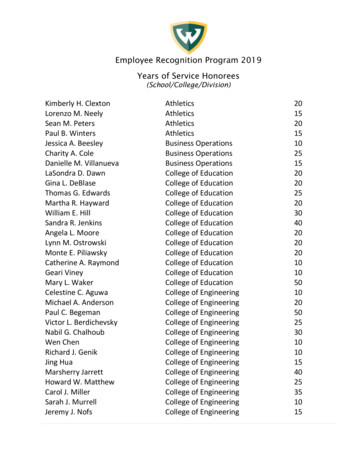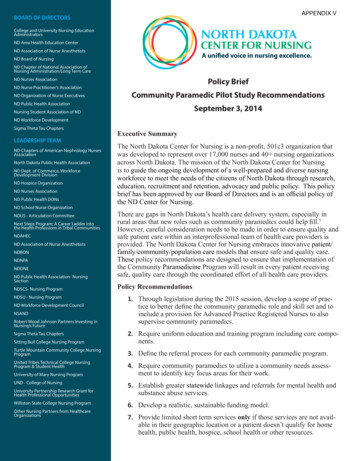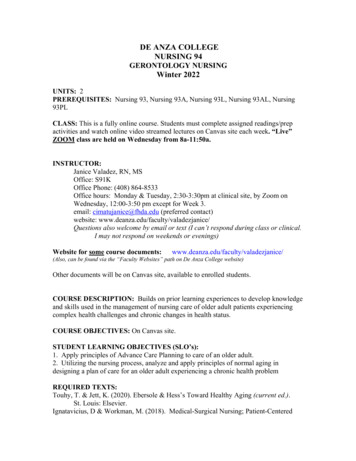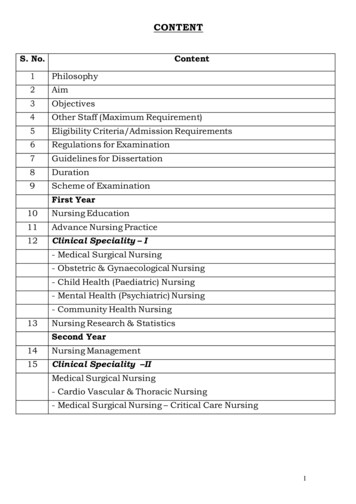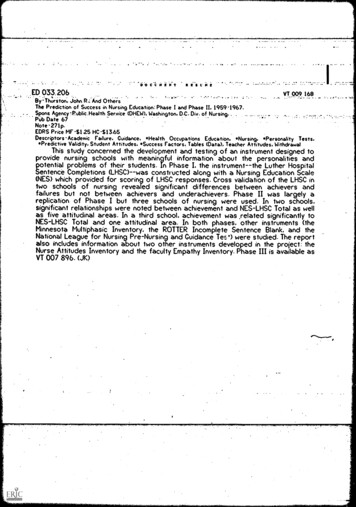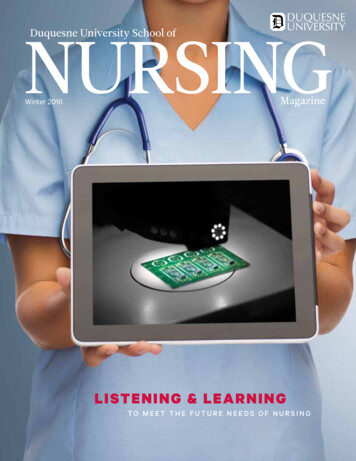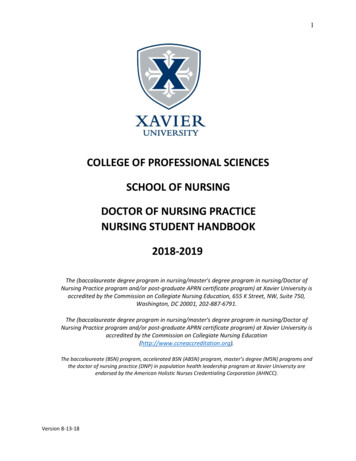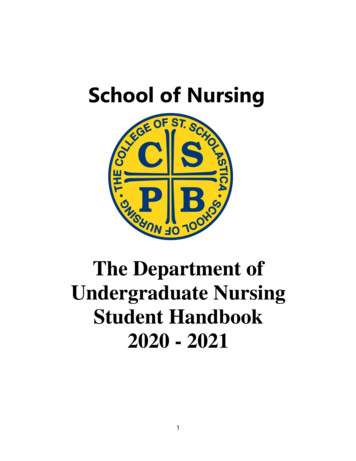
Transcription
School of NursingThe Department ofUndergraduate NursingStudent Handbook2020 - 20211
The College of St. ScholasticaValues from theBenedictine HeritageCommunitySharing responsibility to create and support community. Creating a climate which promotes asense of community while valuing the uniqueness of the individual. Manifesting an ability toadapt to circumstances without compromising our values.HospitalityCreating a welcoming atmosphere personally and institutionally. Listening and respondingsensitively to all. Extending warmth and acceptance to all. Welcoming new ideas and beingopen to change.RespectCherishing and promoting the worth of all human life. Treating persons with dignity andreverence without regard to age, gender, race, minority, sexual preference or economic status.Honoring and supporting the spirituality of each person. Valuing the dignity of all work.Promoting participation of all persons in the decisions affecting their lives.StewardshipUtilizing human resources responsibly. Providing wise and respectful use of all material andmonetary resources. Promoting prudent use of resources and energy. Finding time for work,play and prayer in daily life, which will promote physical, mental and spiritual growth.Love of learningPreserving the intellectual and material heritage entrusted to us by past generations.Transmitting the treasures of human culture to new generations. Creating scholarly, artistic andscientific works which enrich and enlarge human life. Integrating thought and action ascomplementary aspects of a full human life.2
TABLE OF CONTENTSSchool of Nursing and Department OverviewMission Statement of the School of Nursing . 6Vision Statement of the School of Nursing . 6Philosophy of the School of Nursing . 6School of Nursing Inclusivity Statement . 7School of Nursing Organizational Chart . 7AACN Essentials of Baccalaureate Nursing . 8Baccalaureate Program Outcomes . 9Student ResponsibilitiesSchool of Nursing Technology Requirements . 10Student Code of Conduct . 11Student Code of Conduct Pledge . 15Technical Standards for Nursing Students . 15Equal Access Statement . 17Policies and ProceduresBackground Studies . 17Grading . 18Writing Style. 18Late Assignment Policy . 19Academic Progression in the Major . 19Behavioral Progression in the Major . 20Professional Behavior Student Feedback Form . 21Academic Honesty Policy and Dishonesty Procedures . 21Reporting Academic Dishonesty . 21Progression Probation and/or Dismissal from a Program . 22Absences . 22Leave of Absence . 23Medical Leave . 23Conflicts/Grievances . 24Public Health Registration . 24International Honor Society of Nursing . 25Reporting of Accidents/Injuries . .25Student Representation . 26Student Nurses Association . 26Sister M Olivia Gowan Award . 27The Brigadier General Bester Leadership Award . 27The Student Center for Health and Well Being . 27The Tutoring Center . 28The Writing Center. 28Participating in the Learning Community . 283
TRADITIONAL AND POST-BACC NURSING TRACKSClinical PoliciesClinical Experiences . 30Clinical Absences and Remediation . 30Clinical Dress Code Policy . 31Clinical Compliance Policy. 31Liability Insurance . 31Licensure Examination (NCLEX-RN) . 31Learning Laboratories . 31RN TO BS NURSING TRACKCollege Honors . 32Program Honors . 32Course/Student Expectations . 33Incomplete Policy . 33Turnitin . 34Portfolio FAQ’s . 34AppendicesStudent Code of Conduct Pledge . AProfessional Behavior Student Feedback Form . BStudent Progression/Probation and/or Dismissal from a Program . CAccident/Injury Incident Report Form . DClinical Dress Code Policy .EClinical Compliance Policy. F4
THE COLLEGE OF ST. SCHOLASTICASCHOOL OF NURSINGTHE UNDERGRADUATE NURSINGSTUDENT HANDBOOKThe purpose of this handbook is to provide a ready reference to policies and proceduresspecific to baccalaureate nursing students at The College of St. Scholastica. It is the student’sresponsibility to become familiar with the policies and procedures in The College of St.Scholastica Student Handbook and The College of St. Scholastica Undergraduate Catalog. Thishandbook supplements these College-wide publications and provides specific informationabout the policies and procedures of the School of Nursing. Changes or updates to thishandbook are made at the end of each academic year and published before the next. Changesmade during the academic year will be communicated to current students via The College of St.Scholastica email.Students should consult their advisor if they have questions not addressed in these documents.The College of St. Scholastica does not discriminate on the basis of age, race, color, nationalorigin, sex, or handicap in its programs and activities. Inquiries regarding the nondiscriminationpolicies are handled by the Center for Equal Access which is located in SCI 1115, (218) 6254891.5
MISSION STATEMENT OF THE SCHOOL OF NURSINGThe School of Nursing educates students to be socially conscious and morally responsible nurseleaders who promote holistic health for all.VISION STATEMENT OF THE SCHOOL OF NURSINGConsistent with the Benedictine tradition and Catholic Social Teaching, the School of Nursingenvisions a world where all have access to the conditions necessary for health and humanflourishing.PHILOSOPHY OF THE SCHOOL OF NURSINGNursing is fundamentally a holistic endeavor on which the physical, emotional, social, andspiritual welfare of persons depends. It is the enactment of nurses’ moral imperative to care forself and others in health and illness at life’s most significant and vulnerable moments, frombirth to death. At these moments, a person’s experience of health and illness is inseparablefrom the nurse’s intention, presence, and skilled action.The meaningful work of Nursing is accomplished in a relational environment of connection,compassion, caring, creativity, and critical intention. The profession is informed not only byevidence from discipline-specific knowledge and intuition but also the liberal arts and sciences,technology, integrative therapies, and the healing power of the therapeutic relationship.In its healing relationships with individuals, families, colleagues, communities, and populations,Nursing first and foremost respects and upholds the inherent dignity and worth of all persons.The least among us have been created by God and have infinite capacity for healing, change,growth, and development. Nursing works in committed partnership with those it serves to useits specialized knowledge of health and illness to actualize that capacity, to reduce healthdisparities, and to integrate principles of social justice into practice. Nursing’s commitment tothe dignity and uniqueness of all persons is supported by commitments to self-care and to theintegrity of the profession.6
SCHOOL OF NURSING INCLUSIVITY STATEMENTNurses are called to promote human dignity and advocate for human rights. Because of an everchanging cultural environment in nursing and health care, an open dialogue must occur in asafe environment in which students and faculty can engage in conflictual discussions, challengeprovocative comments, and evaluate aspects of structural dynamics that perpetuate injusticeand exclusion in educational, work, and community environments.Bringing attention to expressions of cultural bias is a way to model inclusivity and diversity. Atany time during the course, a “pause,” or “moment of consideration” can be requested. Thiscan and should be done by anyone, student or faculty, in order to facilitate helpful dialoguearound sensitive issues such as stereotyping. These moments are times for all of us to learnhow to become more aware of our language and actions (or inactions). Such dialogue maypertain to stereotypes related to race and ethnicity, religion, age, ability, sex, gender identity,sexual preference, weight, economic status, and anything that may impact the dignity ofpersons.We wish to foster an inclusive culture that fosters equitable and empathic treatment ofstudents, patients and instructors. These moments of consideration are welcome in theclassroom and are essential aspects of learning in this course.SON ORGANIZATIONAL CHART7
AMERICAN ASSOCIATION OF COLLEGES OF NURSING ESSENTIALS OF BACCALAUREATENURSINGExecutive Summary: The Essentials of Baccalaureate Education for Professional NursingPractice (2008)This Essentials document serves to transform baccalaureate nursing education by providing thecurricular elements and framework for building the baccalaureate nursing curriculum for the21st century. These Essentials address the key stakeholders’ recommendations and landmarkdocuments such as the IOM’s recommendations for the core knowledge required of allhealthcare professionals. This document emphasizes such concepts as patient-centered care,interprofessional teams, evidence-based practice, quality improvement, patient safety,informatics, clinical reasoning/critical thinking, genetics and genomics, cultural sensitivity,professionalism, and practice across the lifespan in an ever-changing and complex healthcareenvironment.Essentials I-IX delineate the outcomes expected of graduates of baccalaureate nursingprograms. Achievement of these outcomes will enable graduates to practice within complexhealthcare systems and assume the roles: provider of care; designer/manager/coordinator ofcare; and member of a profession. Essential IX describes generalist nursing practice at thecompletion of baccalaureate nursing education. This Essential includes practice-focusedoutcomes that integrate the knowledge, skills, and attitudes delineated in Essentials I – VIII. Thetime needed to accomplish each Essential will vary, and each Essential does not require aseparate course for achievement of the outcomes.The nine Essentials are: Essential I: Liberal Education for Baccalaureate Generalist Nursing Practiceo A solid base in liberal education provides the cornerstone for the practice andeducation of nurses. Essential II: Basic Organizational and Systems Leadership for Quality Care and PatientSafetyo Knowledge and skills in leadership, quality improvement, and patient safety arenecessary to provide high quality health care. Essential III: Scholarship for Evidence Based Practiceo Professional nursing practice is grounded in the translation of current evidenceinto one’s practice. Essential IV: Information Management and Application of Patient Care Technologyo Knowledge and skills in information management and patient care technologyare critical in the delivery of quality patient care. Essential V: Health Care Policy, Finance, and Regulatory Environmentso Healthcare policies, including financial and regulatory, directly and indirectlyinfluence the nature and functioning of the healthcare system and thereby areimportant considerations in professional nursing practice. Essential VI: Interprofessional Communication and Collaboration for Improving PatientHealth Outcomeso Communication and collaboration among healthcare professionals are critical todelivering high quality and safe patient care.8
Essential VII: Clinical Prevention and Population Healtho Health promotion and disease prevention at the individual and population levelare necessary to improve population health and are important components ofbaccalaureate generalist nursing practice. Essential VIII: Professionalism and Professional Valueso Professionalism and the inherent values of altruism, autonomy, human dignity,integrity, and social justice are fundamental to the discipline of nursing. Essential IX: Baccalaureate Generalist Nursing Practiceo The baccalaureate-graduate nurse is prepared to practice with patients,including individuals, families, groups, communities, and populations across thelifespan and across the continuum of healthcare environments.o The baccalaureate graduate understands and respects the variations of care, theincreased complexity, and the increased use of healthcare resources inherent incaring for patients.Learning opportunities, including direct clinical experiences, must be sufficient in breadth anddepth to ensure the baccalaureate graduate attains these practice-focused outcomes andintegrates the delineated knowledge and skills into the graduate’s professional nursing practice.Clinical learning is focused on developing and refining the knowledge and skills necessary tomanage care as part of an interprofessional team. Simulation experiences augment clinicallearning and are complementary to direct care opportunities essential to assuming the role ofthe professional nurse. A clinical immersion experience provides opportunities for buildingclinical reasoning, management, and evaluation skills.Source: als08.pdfFaculty has developed the curriculum and program outcomes for the undergraduate nursingtracks. The program outcomes are derived from the above mentioned professional guidingdocuments, Minnesota Nurse Practice Act, and The College of St. Scholastica’s institutionalmission and Benedictine Values.BACCALAUREATE PROGRAM OUTCOMESUpon completion of program of study, the graduate will earn a Bachelor of Science Degree witha major in Nursing and will:1. Synthesize knowledge from nursing, the arts and sciences and the Benedictine values inthe holistic practice of professional nursing.2. Demonstrate values and behaviors consistent with professional nursing standards.3. Demonstrate competence in utilizing patient care technologies and information systemtechnologies in dynamic healthcare environments.4. Integrate effective inter-professional collaboration into practice to enhance the health ofall patients, including diverse and vulnerable populations.5. Utilize knowledge of healthcare policy and evidence-based nursing to advocate for thequality and safety of patient care.9
STUDENT RESPONSIBILITIESSchool of Nursing Technology Requirements JmVLyK1077O9aYsqlG5s576GhLUTi02NZFaUCY/edit?ts 5ebd5f3fIn order to ensure all nursing students have the technology they need to be successful in theircourses the SON will now require all undergraduate and graduate students in our programs toown or have access to electronic devices that support the exam and simulation software usedin their programs. Tablets do not support these software programs and resources. Thespecifications are described below:1.A laptop or desktop computer.Either: Mac OS 10.13 or higher ("High Sierra," "Mojave," "Catalina," or newer) orWindows 10 (patched & updated)note: windows 8 & earlier is not acceptable. MacOS "Sierra" andearlier are not acceptable.note: due to exam and simulation software requirements, a tablet orchromebook are not acceptable as the students *sole* computer.These devices may be used in class or other situations for casualuse, but are not compatible with nursing software needs.2.PeripheralsThe following are typically part of the laptop or monitor. You must have one each of thefollowing: web-enabled cameraspeakers/headphones3. microphone Anti-Virus In addition, all students are required to have anti-virus software on theircomputers. This software must be updated regularly (no less frequently thanweekly).4.Word Processing, Spreadsheet, Presentation Software-Both Microsoft Office and Google Suite are available free for students. Office is available here: https://www.css.edu/office/10
G-suite is available here: https://drive.google.com/ (log in with yourcss.edu account)The College strongly recommends using a computer that was purchased within the last 2 years.Older computers frequently cannot handle software requirements.In many cases, financial aid may be used to cover the cost of a new computer. If you would liketo explore this possibility, please discuss with a financial aid counselor.STUDENT CODE OF CONDUCTStudents are expected to behave in accordance with The College Code of Conduct at aminimum, and as pre-professional students to also abide by the standards and codes of thenursing profession. The SON follows College policies regarding Academic Honesty (pg. 15), andCollege Code of Conduct violations: icy-library.html#CodeOfConductThe faculty of the School of Nursing adhere to the standards and codes developed by theAmerican Nurses Association (ANA). A code of ethics is a central and critical component of aprofession. The Code of Ethics for Nurses (ANA, 2015) reflects our fundamental values asprofessional nurses and serves as a social contract with the public we serve. Students in theSchool of Nursing are viewed as developing professionals. For this reason, attainment ofdesired professional behaviors in addition to academic achievement is necessary forprogression in a program of study. It is expected that all students will adhere to thisprofessional code in all of their nursing activities (class, lab, clinical experiences, and any time astudent is representing the School of Nursing).Provision 1. The nurse practices with compassion and respect for the inherent dignity, worth,and unique attributes of every person.Provision 2. The nurse’s primary commitment is to the patient, whether an individual, family,group, community, or population.Provision 3. The nurse promotes, advocates for, and protects the rights, health, and safety ofthe patient.Provision 4. The nurse has authority, accountability, and responsibility for nursing practice;makes decisions; and takes action consistent with the obligation to promote health and toprovide optimal care.Provision 5. The nurse owes the same duties to self as to others, including the responsibility topromote health and safety, preserve wholeness of character and integrity, maintaincompetence, and continue personal and professional growth.11
Provision 6. The nurse, through individual and collective effort, establishes, maintains, andimproves the ethical environment of the work setting and conditions of employment that areconducive to safe, quality health care.Provision 7. The nurse, in all roles and settings, advances the profession through research andscholarly inquiry, professional standards development, and the generation of both nursing andhealth policy.Provision 8. The nurse collaborates with other health professionals and the public to protecthuman rights, promote health diplomacy, and reduce health disparities.Provision 9. The profession of nursing, collectively through its professional organizations, mustarticulate nursing values, maintain the integrity of the profession, and integrate principles ofsocial justice into nursing and health policy.Professional Behaviors and Academic Integrity: Classroom, Online, ClinicalAs in all professional environments, the following behaviors demonstrate commitment toprofessional standards of conduct: Actively promotes the highest level of moral and ethical principles for self and others,and accepts responsibility for own actions. Treats others with respect and promotes an environment that respects human rights,values and choice of cultural and spiritual beliefs. Collaborates with and respects the work of classmates. Is respectful of all faculty and staff involved in the administration and delivery of theprogram. Demonstrates good judgment, completes all responsibilities related to the safe nursingcare of his/her patients and their families. Develops and maintains professional relationships that are mature, sensitive, andeffective under highly stressful circumstances in environments that can change rapidlyin unpredictable and significant ways. Demonstrates empathy and caring for others and acts with integrity in all situations. Exhibits a positive attitude and respectful behavior during class, lab, and clinicalexperiences as well as during all other activities associated with the program andprofession. Positive attitude includes interest, punctuality, willingness to teach others,willingness to learn and share in educational experiences, as well as the ability toreceive feedback and evaluation in a self-reflective and non-defensive manner. Strives to achieve and maintain an optimal level of personal wellness (i.e. coming toclinical well-rested, abstain from the use of alcoholic beverages/substances in theacademic and clinical setting which may impair judgment). Health Insurance Portability and Accountability Act (HIPAA) regulations must befollowed at all times. Professional values, ethical standards, and adherence to HIPAA requirements extend toall forms of social media. Violations in relation to these professional standards andbehaviors may result in exclusion from the nursing program. Upholds the Benedictine values, College and School policies and regulations related toacademic and clinical performance.12
American Nurses Association. (2015). Code of ethics for nurses with interpretive statements.Silver Spring, MD: American Nurses Association.Summary of Expected Professional Behaviors for ALL StudentsClassroom/LabIs on time for scheduled classesAttendance is required. Anyabsences must becommunicated to faculty percourse syllabus.Attends all classes and isequipped and well-preparedAdheres to dress code whereapplicableCompletes assignments ontime and submitted perinstructor directionBeing attentive to anddemonstrating respectfulbehaviors towards thefaculty/section instructorpresenting the classBeing attentive to andrespectful of classmatesdiscussing questions, cases orissues raised during classAppropriately seeks feedbackand is receptive to feedback,incorporating feedback intoworkCommunicates with faculty,staff, and peers in a respectfulmannerIdentifies learning needs;educates self; uses professionalresourcesRefrain from any deliberateaction or omission of care inthe academic or clinical settingthat creates unnecessary risk ofOnlineIs on time for scheduledsynchronous sessionsAttendance is required. Anyabsences must be communicatedto faculty per course syllabus.ClinicalIs on time for clinical per instructordirectionsAttendance is required. Anyabsences must be communicatedto faculty per course syllabus.Attends all scheduled mandatorysynchronous sessions and isequipped and well-preparedAdheres to dress code whereapplicableCompletes assignments on timeand submitted per instructordirectionBeing attentive to anddemonstrating respectfulbehaviors towards thefaculty/section instructorpresenting the class; this includesvirtual and asynchronouscourseworkBeing attentive to and respectfulof classmates discussingquestions, cases or issues raisedduring classAppropriately seeks feedbackand is receptive to feedback,incorporating feedback into workAttends all clinical experiences andis equipped and well-preparedCommunicates with faculty, staff,and peers in a respectful manner,including netiquetteIdentifies learning needs;educates self; uses professionalresourcesRefrain from any deliberateaction or omission of care in theacademic or clinical setting thatCommunicates with faculty, peers,agency staff, patients and familiesin a respectful mannerIdentifies learning needs aroundclient issues; educates self; usesprofessional resourcesRefrain from any deliberate actionor omission of care in theacademic or clinical setting that13Adheres to dress code of schooland clinical siteCompletes assignments on timeand submitted per instructordirectionBeing attentive to anddemonstrating respectfulbehaviors towards thefaculty/section instructor leadingthe clinical experience.Being attentive to and respectful ofclassmates discussing questions,cases or issues raised duringclinicalAppropriately seeks feedback andis receptive to feedback,incorporating feedback into work
injury to the client, self, orothers.Engages in self-reflectionregarding cultural differences.Seeks to foster an inclusiveenvironment. Lives out thevalue of respect and isnonjudgmental about cultural,ethnic and personal differencesMaintains confidentiality ofclinical information; HIPAAregulations must be followedIs accountable for ownlearning; practices academicintegrity, includingcommunication in a timelymannerCommunicates and exchangesclinical information effectively,accurately, and in a timelymanner with faculty, staff, andcolleagues. Describe the healthhistory, patient problems, andin
This Essentials document serves to transform baccalaureate nursing education by providing the . integrity, and social justice are fundamental to the discipline of nursing. Essential IX: Baccalaureate Generalist Nursing Practice o The baccalaureate-graduate nurse is prepared to practice with patients, including individuals, families, groups .
